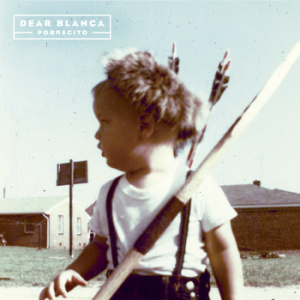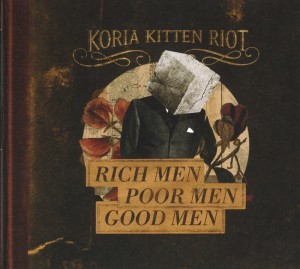Last updated on September 23, 2014

The mix of an album can tell you a lot about the priorities of its creators. Dylan Dickerson’s frantic, fractured voice is cranked about as high in the mix of Dear Blanca‘s Pobrecito as possible, which tells me that they care about the raw, ragged, real aspects of performance. Look no farther than the wordless, anguished roar that is the chorus of “Showplace” for proof. The intense alt-country songwriting behind the pipes matches Dickerson’s careening, manic vocal quality. In other words, Conor Oberst and Dickerson would have plenty to talk about.
But like Bright Eyes, Dickerson and co. aren’t all raging fury. The (relatively) pensive “Noma” includes a musical saw that gives the tune a Neutral Milk Hotel feel (Mangum, of course, being another vocalist who celebrated the rough edges of his non-traditional voice). Dickerson can write a pop song, too: “Huff” has a great guitar riff and a (relatively) restrained vocal performance. But it’s loud, noisy alt-country rock that is his natural home, which is why even the rhythmically tight, acoustic-led “Priscilla” turns into a torrent of guitar distortion and a repeated hollering of the titular character’s name in the chorus. Closer “Cadmus” starts off quiet with acoustic guitar, organ, and female vocals before introducing pounding toms into the tune. Hey, if you’re good at a thing, do that thing.
You like the stomping work of the Drive-By Truckers? Dear Blanca is like the Drive-In-And-Stay-In-Your-Front-Yard-Yelling-Until-You-Come-Out Truckers. Pobrecito is a sweat-drenched, passionate, powerful set of noisy alt-country tunes that will occasionally give you shivers.
—

The mid-’00s were a good time for indie-pop music, with bands like Annuals, Decemberists, Grandaddy, and the Shins purveying a very particular type of giddy, instrument-stuffed pop music that wasn’t being well-represented on the radio. Koria Kitten Riot picks up that torch of shiny, acoustic-led, maximalist indie-pop on Rich Men Poor Men Good Men. It’s the sort of album that includes coconuts imitating horse clip-clops in a way that sounds totally natural (“The Lovers That You’ve Never Had”). It’s twee without being overly cute in the vocals, or serious vocals with a whimsical touch to the arrangements.
“A Last Waltz” stands out as one of the highlight tracks not because it’s particularly more charming that the rest of the tunes here, but because it’s a touch darker. The rest of the album can flow together as one wonderful experience, but track three points itself out as a great track by showing the diversity the band is able to deliver (while still not damaging the flow of the record). “Today’s Been a Beautiful Day” nicks not only the sound but the joyful irony of the era, pairing one of the most chipper melodies and arrangements on the record with a song about a person who gets hit by a car and dies. (Oops, spoilers.) Follow-up “Carpathia” sounds a bit like a brit-pop tune, what with the wistful reverb, processed strings, and discrete acoustic strumming; it’s a nice change of mood that stands out as a highlight.
If you’re into cheerful, instrument-stuffed indie-pop, you’ll find a ton to love in Koria Kitten Riot. You can listen to the whole album and let it wash over your mood, or you can listen to individual tunes; it matters not. It will make you smile either way.
—

Bishop Allen was also doing quirky indie-pop in the mid ’00s, and they’ve since gotten a bit noisier than their indie-pop masterpiece The Broken String. I think they still count as indie-pop on Lights Out, but they’re certainly creeping closer to power-pop.
They make it clear with opener “Start Again,” which is all buzzy synths, classy dance-rock guitars, and propulsive percussion. “Bread Crumbs” makes the dance-rock vibes even more explicit, putting together a wicked bass groove, a protoypical piano hook, and a minimum of lyrics. (And, because this is Bishop Allen, there’s also a bass-heavy horn section.) “Crows” involves some of their traditional quirky rhythms (Latin/island, a la “Like Castanets”), chill melodies, and pristine arrangements, but with a funky bass line. It’s way fun. “Skeleton Key” is another funky tune that’s worth remembering.
The overall sound of Lights Out is more matured, even with the dance-rock tendencies: it’s a poised, refined musicality that runs through the record. The lyrics reflect that aging as well; there are more references to hard times, the existential crises of adulthood (“No Conditions”), and that most adult of rituals: leaving the party early (“Why I Had To Go”). But they never get heavy-handed, morose, or grumpy. It’s a band that grew up, but kept their pop song skills with them. Mazel tov! Here’s to Bishop Allen: long may you write.